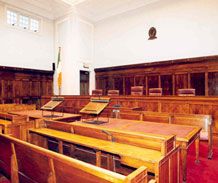 In Trinity College Dublin, where I work, the Long Room Hub is the College’s Arts & Humanities Research Institute. It hosts over 250 events each year, including a discussion series entitled Behind the Headlines, which offers background analyses to current issues by experts drawing on the long-term perspectives of Arts & Humanities research. In particular, the series “aims to provide a forum that deepens understanding, combats simplification and polarization and thus creates space for informed and respectful public discourse.”
In Trinity College Dublin, where I work, the Long Room Hub is the College’s Arts & Humanities Research Institute. It hosts over 250 events each year, including a discussion series entitled Behind the Headlines, which offers background analyses to current issues by experts drawing on the long-term perspectives of Arts & Humanities research. In particular, the series “aims to provide a forum that deepens understanding, combats simplification and polarization and thus creates space for informed and respectful public discourse.”
In the recent past, the series has featured discussions on artificial intelligence, Trump’s America, Syria, and Brexit (not once but twice). The next event in this series will be on Monday 6 November 2017, 6:30pm to 8:00pm, on
…Freedom of Speech: Where Journalism and the Law Collide at the Boundary of 21st Century Debate
In a world where truth is under siege, freedom of speech has never been more important. But, as outrage and offense in public debate become a commodity for social media technology giants, the future of professional journalism in educating public opinion while challenging authority and power is increasingly under attack. …
This discussion is part of the ‘Fears, Factions and Fake News’ symposium held in conjunction with Columbia University and in partnership with Independent News and Media.


 The following appears under the above heading in
The following appears under the above heading in 



